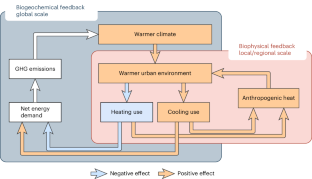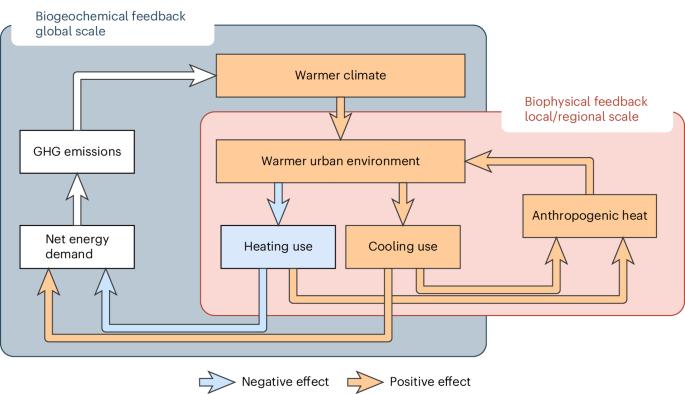Elevated urban energy risks due to climate-driven biophysical feedbacks
IF 29.6
1区 地球科学
Q1 ENVIRONMENTAL SCIENCES
引用次数: 0
Abstract
Climate-driven impacts on future urban heating and cooling (H&C) energy demand are critical to sustainable energy planning. Existing global H&C projections are predominantly made without accounting for future two-way biophysical feedbacks between urban climate and H&C use. Here, using a hybrid modelling framework we show that the prevalent degree-days methods misrepresent the magnitude, nonlinearity and uncertainty in the climate-driven projections of H&C energy demand changes due to the missing two-way feedbacks. We find a 220% increase (47% decrease) in cooling (heating) energy demand with amplified uncertainty by 2099 under a very high emission scenario, roughly twice that projected by previous methods. The spatially diverse H&C demand responses to the warming climates highlight the disparate challenges faced by individual cities and necessitate urban energy planning accounting for local climate–energy interactions. Our study underscores the critical necessity of explicit and dynamic modelling of urban H&C energy use for climate-sensitive energy planning. Climate change affects the energy demand for heating and cooling in cities, which in turn leads to additional urban warming. Here, the authors show that when including such two-way biophysical feedbacks, the cooling (heating) energy demand more than doubles (is halved) under high emissions.


气候驱动的生物物理反馈导致城市能源风险上升
气候对未来城市供热和制冷(H&C)能源需求的影响对可持续能源规划至关重要。现有的全球 H&C 预测主要是在没有考虑未来城市气候与 H&C 使用之间的双向生物物理反馈的情况下做出的。在此,我们利用混合建模框架表明,由于双向反馈的缺失,流行的度日方法错误地反映了气候驱动的 H&C 能源需求变化预测的幅度、非线性和不确定性。我们发现,在极高排放情景下,到 2099 年,制冷(供暖)能源需求将增加 220%(减少 47%),且不确定性增大,大约是以前方法预测的两倍。对气候变暖的不同空间的 H&C 需求反应凸显了各个城市所面临的不同挑战,因此有必要在城市能源规划中考虑当地气候与能源的相互作用。我们的研究强调了对城市 H&C 能源使用进行明确和动态建模对于气候敏感型能源规划的极端必要性。
本文章由计算机程序翻译,如有差异,请以英文原文为准。
求助全文
约1分钟内获得全文
求助全文
来源期刊

Nature Climate Change
ENVIRONMENTAL SCIENCES-METEOROLOGY & ATMOSPHERIC SCIENCES
CiteScore
40.30
自引率
1.60%
发文量
267
审稿时长
4-8 weeks
期刊介绍:
Nature Climate Change is dedicated to addressing the scientific challenge of understanding Earth's changing climate and its societal implications. As a monthly journal, it publishes significant and cutting-edge research on the nature, causes, and impacts of global climate change, as well as its implications for the economy, policy, and the world at large.
The journal publishes original research spanning the natural and social sciences, synthesizing interdisciplinary research to provide a comprehensive understanding of climate change. It upholds the high standards set by all Nature-branded journals, ensuring top-tier original research through a fair and rigorous review process, broad readership access, high standards of copy editing and production, rapid publication, and independence from academic societies and other vested interests.
Nature Climate Change serves as a platform for discussion among experts, publishing opinion, analysis, and review articles. It also features Research Highlights to highlight important developments in the field and original reporting from renowned science journalists in the form of feature articles.
Topics covered in the journal include adaptation, atmospheric science, ecology, economics, energy, impacts and vulnerability, mitigation, oceanography, policy, sociology, and sustainability, among others.
 求助内容:
求助内容: 应助结果提醒方式:
应助结果提醒方式:


